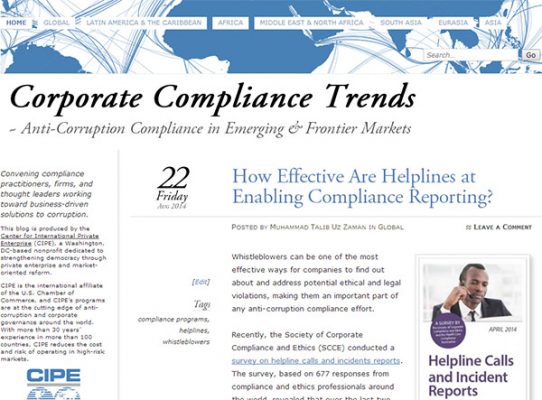The need for anti-corruption compliance programs in companies of all sizes in global value chains has never been greater. Since 2006, the U.S. government has settled or prosecuted nearly 300 corruption cases against companies from around the world, including many where the corrupt conduct originated from multinational corporations’ suppliers, vendors, and agents. The average cost of resolving these enforcement actions now tops $80 million.
value chains has never been greater. Since 2006, the U.S. government has settled or prosecuted nearly 300 corruption cases against companies from around the world, including many where the corrupt conduct originated from multinational corporations’ suppliers, vendors, and agents. The average cost of resolving these enforcement actions now tops $80 million.
Beyond the U.S. Foreign Corrupt Practices Act (FCPA) and the UK Bribery Act, new anti-corruption laws with international reach are hitting the books, such as Brazil’s Clean Companies Act, introduced earlier this year. Similarly, many international bodies, including the Organisation for Economic Co-operation and Development (OECD) and the International Chamber of Commerce, have introduced conventions and norms meant to combat bribery of foreign officials. Few doubt that this growing global trend toward rooting corruption out of international business conduct is here to stay.
Still, as a recent study found, the number of global companies with anti-corruption policies has increased by only 1 percent over the past two years, and a sizable minority of these companies have yet to implement even the most basic of compliance programs. Nearly 60 percent of global companies surveyed said they never train third parties despite the fact that many compliance actions have resulted from conduct by agents or intermediaries.
While governments and international organizations set anti-corruption rules and standards, and while law enforcement agencies around the world aggressively pursue potential violations, many companies simply lack sufficient practical knowledge on how to comply with these new global norms. Understanding what effective anti-corruption compliance looks like and how to set up internal compliance programs that mitigate the risk of corruption is an especially daunting challenge for firms operating in emerging and frontier markets, where the Center for International Private Enterprise (CIPE) has worked since 1983 with local partners such as chambers of commerce, business associations, and economic think tanks.
To share our experiences from supporting private sector-focused anti-corruption programs in high-risk countries around the globe, and to help advance international best practices on anti-corruption compliance in these countries, CIPE is launching this new website, Corporate Compliance Trends.
Published Date: August 26, 2014